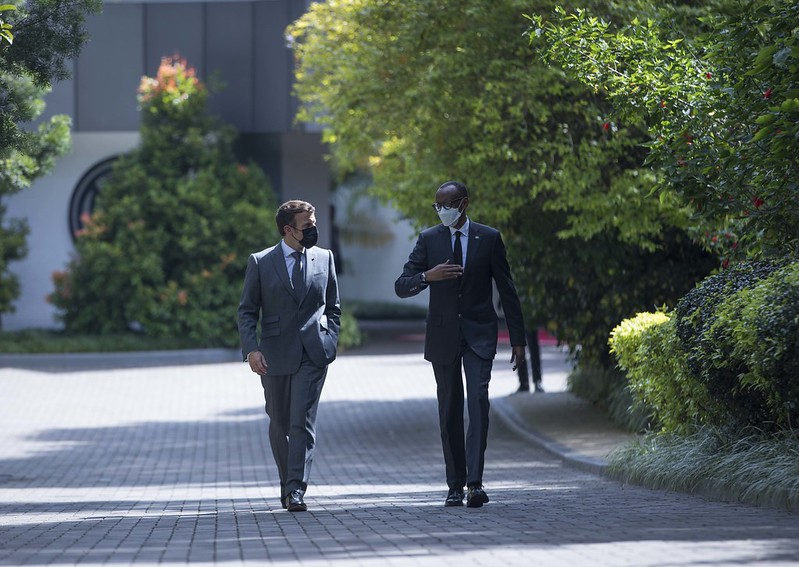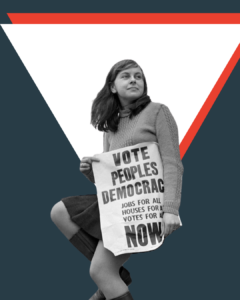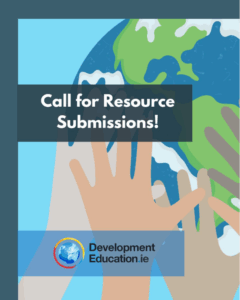
- President Emmanuel Macron of France walking with President Paul Kagame of Rwanda in Kigali in May 2021 during an official visit. Photo by Paul Kagame via Flickr (CC-BY-NC-ND)
Aoife Mc Donald asks 7 questions about recent attempts by France to reform its postcolonial relationships based on President Macron’s visit to Rwanda and the Duclert Report about the Rwandan genocide.
1. Why did President Macron visit Kigali?
French President Emmanuel Macron visited Rwandan capital Kigali in May to “write a new page” in the relationship between the two countries, which has been strained at best since the 1994 Tutsi genocide. This year marks the 27th anniversary of the atrocity.
During a speech at the Kigali Genocide Memorial, where 250,000 victims of the mass killings are buried, Macron asked the Rwandan people for forgiveness for France’s role in genocide. His comments followed a report that concluded France bore a “serious and overwhelming responsibility” for the 1994 mass killings that left as many as 800,000 people dead.
2. What was the report? Why was it commissioned?
The report, compiled by a group of fifteen historians led by Vincent Duclert, examined the role of France in Rwanda from 1990-1994, and the level of responsibility France had in the genocide.
The report was commissioned by Macron himself in May 2019, the 25th anniversary of the killings, at a time of reckoning for France. French newspapers, television and radio stations were all debating one central, unanswered question: whether then-President François Mitterrand and high-ranking officials were complicit in the 1994 slaughter of up to 800,000 Tutsis by Hutu militias while nearby, French soldiers waited for orders from Paris that never came.
The commission was given access to the personal archives of Mitterrand, which previously had been closed. Following two years of research, the commission concluded that the French government was responsible, but not complicit, in the massacre.
The report is a move to repair and strengthen the relationship of France and Rwanda, which have not had diplomatic ties since 2006, and comes amid increased French aid and investment in Rwanda.
A second 600-page report, commissioned by Rwanda in 2017 and released in April of this year, came to a more damning conclusion:
It is our conclusion that the French government bears significant responsibility for enabling a foreseeable genocide. For many years, the French government supported the corrupt and murderous regime of Rwandan President Juvénal Habyarimana. French officials armed, advised, trained, equipped, and protected the Rwandan government, heedless of the Habyarimana regime’s commitment to the dehumanization and, ultimately, the destruction and death of Tutsi in Rwanda. French officials did so to advance France’s own interests, in particular the reinforcement and expansion of France’s power and influence in Africa. And they did so despite constant and ever increasing evidence that a genocide was foreseeable.
France, it claims, knew genocide was coming but remained “unwavering in its support” of the Hutu government, and was a “collaborator” of the regime that carried out the killings.
3. What were the findings of the Duclert report?
The report found numerous failings on the part of the French government and diplomats, as well as significant shortcomings of the humanitarian mission Opération Turquoise, launched by Paris under a UN mandate in June 1994. Below are some of the conclusions from the report.
“[T]he French authority demonstrated a continual blindness in their support for a racist, corrupt and violent regime.”
The report concluded that France supported the regime of President Juvénal Habyarimana which encouraged racist massacres and was “blind” to the preparation of genocide. It stopped short of branding France as an accomplice, stating that the country was not “willingly involved” in the genocide.
Mitterrand himself “maintained a strong, personal and direct relationship with the Rwandan head of state”, it said.
“It adopted a binary view opposing on the one hand the “Hutu ally” embodied by President Habyarimana, and on the other hand the enemy described as ‘‘Ugandan-Tutsi’’ for the RPF.”
The French government took a binary view of the situation in Rwanda. Mitterrand and his inner circle feared a Tutsi rebellion, as the Tutsi-led Rwandan Patriotic Front (RPF) had previously led an invasion of Rwanda with the backing of Uganda. As an English speaking country, Ugandan involvement in Rwanda would signify the encroachment of the Anglosphere and a diminishing francophone Africa.
The report found that the French government did not react to multiple warnings of Hutu extremism in the period of the 6-11 April, the first six days of the attacks. French officials were worried that RPF forces would soon attack, and hoped to avoid being dragged into a civil war – despite being alerted that the RPF were not involved.
“France’s wish to avoid direct intervention in Rwanda, without however, allowing the RPF to take total and definitive power, led to a passive policy, to say the least, in April and May 1994, at the height of the genocide.”
The report found that the French diplomatic presence validated the Hutu regime. Following the attack which killed President Habyarimana on April 6, France evacuated its nationals, and prioritised the evacuation of relatives of Habyarimana’s wife.
On the 7 April, the French ambassador to Rwanda, Jean-Michel Marlaud, offered his compound as refuge for political figures who were under threat. More than 90 refugees were reported there the next day, including ministers, diplomats and senior officials linked to Hutu extremists, who feared an RPF offensive. Only one, Alphonse Nkubito, was part of the democratic opposition. The rest were supporters of Habyarimana.
The Embassy organised a preparatory meeting on the constitution of the new interim government on the 8 April. Marlaud informed Paris that Théodore Sindikubwabo was the new president, and Jean Kambanda his prime minister. He claimed that the other ministries were shared out between members of the democratic opposition, which was not the case. Half of the ministries were held by members of the National Revolutionary Movement for Development (MRND), linked with Habyarimana, and the other representatives were all members of various Hutu extremist groups.
On the 11 April, the French ambassador requested the urgent closure of the embassy as the situation in Kigali worsened. Several convoys were needed for the evacuation the following morning, for embassy staff, sensitive personnel, and ‘political opponents’. Before leaving, Marlaud burnt diplomatic archives in the garden of the Embassy.
“In July 1994, the populations found in the Humanitarian Safe Zone (HSZ) in western Rwanda, several million people, were mostly Hutu and among them were not only the murderers but also the masterminds of the genocide, whom the French political authorities refused to arrest.”
French troops led the military-humanitarian intervention Operation Turquoise between June and August 1994. The Operation established a Humanitarian Safe Zone in Western Rwanda, near the border with Zaire (modern-day Democratic Republic of the Congo).
The humanitarian action was dealing with the mass exodus of hundreds of thousands, severe food shortages and a cholera epidemic as well as the genocide. Despite the Operation starting out with “strict orders for neutrality”, and despite widespread international recognition of the genocide of the Tutsi, the RPF continued to be perceived as the main threat by the French forces. This meant the intervention ended up aiding mostly Hutu.
4.Why did Macron not apologise?
In his speech given at the Kigali Genocide Memorial, Macron acknowledged France’s responsibility in the 1994 genocide, but was careful not to apologise.
Despite many Rwandans hoping for an apology, French domestic politics prevented the possibility. Marine Le Pen, the leader of the extreme rightwing National Rally, brandished the Rwandan government as “violently anti-French” for rejecting the French language in favour of English, and similarly criticised Macron for his policy of reconciliation. In the hopes of maintaining conservative voters as he faces reelection next year, Macron opted instead to ask for forgiveness.
In response to Macron’s plea for forgiveness, Rwandan President Paul Kagame described Macron’s words as “something more valuable than an apology – they were the truth.” This is surprising, too, as Kagame, the former leader of the RPF, has accused France of participating in the genocide on numerous occasions.
5. Is this a move to decolonise history?
The Duclert report and the visit to Kigali are part of a wider pattern of reconciliatory efforts by Macron’s government. Another report was released earlier this year on the Algerian War of Independence, as well as a report on the potential return of historical and cultural artefacts taken from Africa by French colonisers. The question remains: how genuine are these efforts of reconciliation?
Economic growth and growing political influence in Africa are attracting countries such as France, Russia, China, Turkey, Japan, India, and the United Kingdom to build relations with the African continent.
In a move to reshape relations, France held a global Summit in Paris on 18 May on the Financing of African Economies. The summit, which emphasised the need for international organisations to support economic recovery in Africa, was attended by 22 African heads of state. This will be followed by the 28th Africa-France Summit in Montpellier in October. The October Summit offers a chance for France to reform its postcolonial relationship with Africa.
Macron is turning away from the era of the ‘Françafrique’, when Paris provided security for heads of state of former colonies in exchange for captive markets and guaranteed votes at the UN, by attempting to strengthen ties with countries outside of France’s traditional sphere of influence.
Last November, he told the magazine Jeune Afrique that he did not want France “to remain prisoner of our past”. France is no longer reaping the rewards from its former colonies in Africa, instead getting caught up in conflict in West Africa, and being pressured to work with longtime autocrats.
Reparative acts, too, may be an attempt at liberating France from this prison of its own making – as well as bringing it closer to potential new allies, like Rwanda.
Following the trip to Kigali, Macron visited South Africa for the first time, to expand “mutually beneficial trade and investment opportunities”. Rwanda itself, a former Belgian colony, is French-speaking, relatively prosperous and at the forefront of digital investments, making it a perfect target for renewed diplomatic (and business) relations.
6. Where are Rwandan voices in all of this?
Many Rwandans feel that Macron’s actions fell short of expectations. Egide Nkuranga, president of Ibuka, the main survivors’ organisation, said he was disappointed that Macron did not “present a clear apology on behalf of the French state”.
Critics of Kagame’s regime warn that Macron’s visit only legitimises the rule of an authoritarian leader. President Paul Kagame, now in his 27th year as leader, has also been accused of running an authoritarian, one-party state. Dissent is not tolerated, and Amnesty International has denounced “the forced disappearances of members of the opposition”.
Two of Rwanda’s highest-profile opposition leaders, Victoire Ingabire and Bernard Ntaganda, have accused Macron of ignoring the political situation of their country. Publicly, he is ready and willing to condemn dictatorial regimes, but he “keeps silent with regard to the authoritarian rule and human rights abuses by the Rwandan regime,” they said in a statement.
Compared with his predecessors, Macron is not afraid to admit to France’s past wrongs, according to Kigali-based researcher Frederick Golooba-Mutebi in an interview for the state-run news agency Anadolu Agency, based in Ankara.
“Macron is from a different generation of French people. The generation of Europeans who would have seen Africa as a place to dominate, as a place to exploit, is dying out. So you are getting young Europeans with different views, who actually think that the (colonial) activities of Europeans in Africa are something to atone for,” he said.
Golooba-Mutebi adds:
“The new liberal European politicians are bound to be of the view that something has to be done to correct historical mistakes and I think that’s where Macron is coming from.”
Apart from the official line of Kagame, the statement from Ingabire and Ntaganda plus commentary from Golooba-Mutebi, Rwandan voices are thin on the ground in the coverage of Macron’s trip, likely due to continued limited freedom of speech and restricted space for civil society groups in the country, as has been extensively documented by CIVICUS.
7. Is history repeating itself?
Macron and the French government have also received criticism for the visit to Kigali in France and internationally. A recent editorial in Le Monde warned that recognition of French guilt for the events of 1994 “does not justify turning a blind eye to the authoritarian character of the current Rwandan government.”
Human Rights Watch has highlighted the crimes against humanity committed by Rwandan troops in the eastern Democratic Republic of Congo (DRC), which the Rwandan government has continued to ignore. At a summit in Paris on post-pandemic financing for the African continent, Kagame deflected questions on the crimes committed in the DRC following the genocide.
In the same interview, Kagame dismissed concerns about Paul Rusesabagina, the hero of the film “Hotel Rwanda,” who was duped into boarding a flight to Kigali last year and is facing charges there, including of terrorism.
History shows us the costs of overlooking violations of human rights for selfish gain. Accepting responsibility for the past is not enough – governments must ensure justice for the present.
- This article has been published as part of developmenteducation.ie’s History Wars series.
Aoife Mc Donald is a master’s student in International Relations at University College Dublin and research intern with 80:20 Educating and Acting for a Better World
More on developmenteducation.ie

Beth Doherty: Youth Activism and the Climate Crisis
From School Strikes to Global Climate Talks The latest episode of the Irish Global Solidarity in 100 Objects podcast features Beth Doherty, climate activist and

Mary Lawlor: Defending Human Rights Defenders
A Conversation with the UN Special Rapporteur for Human Rights Defenders The latest episode of the Irish Global Solidarity in 100 Objects podcast features Mary

Irish Women in Activism and Advocacy: In Awe of All Mná
Explore inspiring stories of Irish women in activism and advocacy who have fought for human rights, social justice, and equality at home and abroad

Call for resource submissions open – education resources during an era of climate promises, disinformation and pandemics
Submit or recommend resources to be included in the Ireland-wide audit of development education and global citizenship education resources.

Podcast: If Another World Is Possible, It Is Up to Us to Make It So
A Reflection on Palestinian Solidarity and Collective Action In this episode of the Irish Global Solidarity in 100 Objects podcast, Ciara Regan revisits her 2021

Podcast: Exploring Global Citizenship with a Ball of String
The Power of Simple Tools in Teaching Global Citizenship Sometimes, the most impactful lessons come from the simplest tools. In this episode of the Irish
